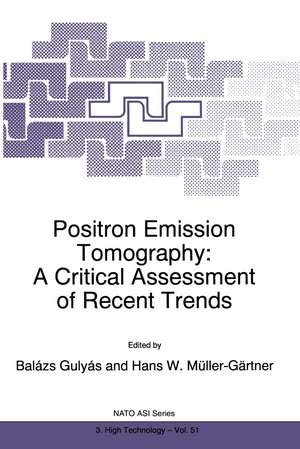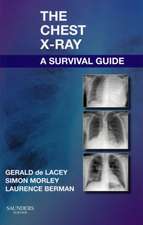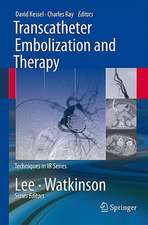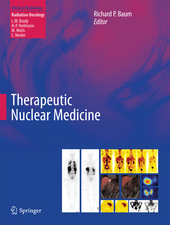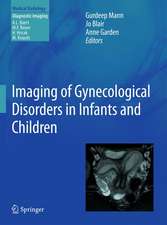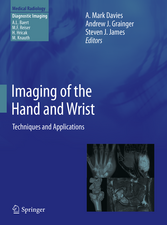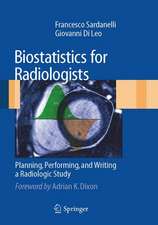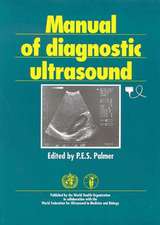Positron Emission Tomography: A Critical Assessment of Recent Trends: NATO Science Partnership Subseries: 3, cartea 51
Editat de Balázs Gulyás, Hans W. Müller-Gärtneren Limba Engleză Paperback – 14 oct 2012
The chapters systematically guide the reader from the basics of the technique - including new camera designs, new drugs, and new statistical and image processing approaches - through its most important clinical applications - in neurology, psychiatry and oncology - to the most sophisticated neuroscience applications, including research into human sensory and motor systems, the functional organisation of imagery, volition, attention and consciousness in the human brain.
Din seria NATO Science Partnership Subseries: 3
- 24%
 Preț: 1567.19 lei
Preț: 1567.19 lei - 18%
 Preț: 2106.37 lei
Preț: 2106.37 lei -
 Preț: 393.13 lei
Preț: 393.13 lei -
 Preț: 390.63 lei
Preț: 390.63 lei - 18%
 Preț: 1849.41 lei
Preț: 1849.41 lei -
 Preț: 407.19 lei
Preț: 407.19 lei - 18%
 Preț: 1228.96 lei
Preț: 1228.96 lei - 18%
 Preț: 1843.73 lei
Preț: 1843.73 lei - 15%
 Preț: 642.51 lei
Preț: 642.51 lei -
 Preț: 402.76 lei
Preț: 402.76 lei - 18%
 Preț: 1829.86 lei
Preț: 1829.86 lei -
 Preț: 379.48 lei
Preț: 379.48 lei - 18%
 Preț: 1224.54 lei
Preț: 1224.54 lei -
 Preț: 401.42 lei
Preț: 401.42 lei - 18%
 Preț: 1841.68 lei
Preț: 1841.68 lei -
 Preț: 391.99 lei
Preț: 391.99 lei - 18%
 Preț: 1234.46 lei
Preț: 1234.46 lei -
 Preț: 405.28 lei
Preț: 405.28 lei -
 Preț: 396.62 lei
Preț: 396.62 lei - 18%
 Preț: 1226.73 lei
Preț: 1226.73 lei - 18%
 Preț: 1233.52 lei
Preț: 1233.52 lei - 18%
 Preț: 1228.62 lei
Preț: 1228.62 lei - 5%
 Preț: 377.52 lei
Preț: 377.52 lei - 18%
 Preț: 1830.49 lei
Preț: 1830.49 lei - 20%
 Preț: 336.21 lei
Preț: 336.21 lei - 18%
 Preț: 1225.48 lei
Preț: 1225.48 lei -
 Preț: 397.38 lei
Preț: 397.38 lei - 18%
 Preț: 1830.65 lei
Preț: 1830.65 lei - 15%
 Preț: 650.55 lei
Preț: 650.55 lei - 5%
 Preț: 1416.66 lei
Preț: 1416.66 lei
Preț: 379.69 lei
Preț vechi: 399.67 lei
-5% Nou
Puncte Express: 570
Preț estimativ în valută:
72.66€ • 75.76$ • 60.39£
72.66€ • 75.76$ • 60.39£
Carte tipărită la comandă
Livrare economică 20 martie-03 aprilie
Preluare comenzi: 021 569.72.76
Specificații
ISBN-13: 9789401060974
ISBN-10: 9401060975
Pagini: 496
Ilustrații: IX, 482 p.
Dimensiuni: 160 x 240 x 26 mm
Greutate: 0.69 kg
Ediția:Softcover reprint of the original 1st ed. 1998
Editura: SPRINGER NETHERLANDS
Colecția Springer
Seria NATO Science Partnership Subseries: 3
Locul publicării:Dordrecht, Netherlands
ISBN-10: 9401060975
Pagini: 496
Ilustrații: IX, 482 p.
Dimensiuni: 160 x 240 x 26 mm
Greutate: 0.69 kg
Ediția:Softcover reprint of the original 1st ed. 1998
Editura: SPRINGER NETHERLANDS
Colecția Springer
Seria NATO Science Partnership Subseries: 3
Locul publicării:Dordrecht, Netherlands
Public țintă
ResearchCuprins
one: How to establish and run a PET Center?.- 1. Planning a proposal for a PET centre.- 2. The use and registration of PET radiopharmaceuticals. European and world trends.- 3. FDG distribution - a new market trend.- 4. Status of clinical PET in the USA and the role and activities of the Institute for Clinical PET.- two: PET: Novel methodological approaches.- 5. Recent trends in PET camera designs.- 6. Strategies for radioligand development: Peptides for tumor targeting.- 7. Development of PET radioligands for the quantitation of serotonin receptors in the human brain.- 8. The renin-angiotensin system.- 9. Membrane transporters.- 10. A deformable high resolution anatomic reference for PET activation studies.- 11. Registration: a powerful tool to combine information provided by different imaging modalities.- 12. Quantification of FDG uptake using kinetic models.- 13. Cavinton affects the kinetic constants of FDG accumulation: an application of registration and kinetic modeling.- 14. Whole body scanning.- three: PET in oncology.- 15. Positron emission tomography in oncology. In vivo measurements of protein synthesis in tumors.- 16. Diagnosis, differential diagnosis, and follow-up of tumors by means of FDG PET.- 17. Clinical application of whole-body [18]-FDG-PET in malignant melanoma.- 18. Evaluation of metastatic lymph nodes by means of FDG PET.- 19. Diagnosis, differential diagnosis, and follow-up of intracranial tumors with PET.- four: PET in neurology and psychiatry.- 20. PET studies in neuropharmacology. Novel approaches.- 21. PET studies of the dopamine hypotheses in schizophrenia.- 22. PET and epilepsy in adults.- 23. Mapping cerebral responses to volatile anesthetics in humans.- 24. The effect of a single-dose intravenous vinpocetine on chronic 291 stroke patients.A PET study.- 25. Coupling between cerebral blood flow and metabolism in the primate: methodological and pharmacological issues.- five: PET in neuroscience research.- 26. BrainMapTM: Electronic integration of mind and brain.- 27. Designing activation experiments.- 28. The human motor system: principles versus plasticity.- 29. Activation of the visual ventral stream in humans: an fMRI study.- 30. PET and fMRI studies of cerebellar function in sensation, perception, and cognition.- 31. How to use neuroimaging to study visual attention.- 32. Characterising selective attention with positron emission tomography. Neurophysiological investigations.- six: Appendix.- 33. PET centers and PET projects in Central and Eastern Europe.- 34. PET Centres around the world.- 35. List of contributors.- 36. Index.- 37. Color plates.
